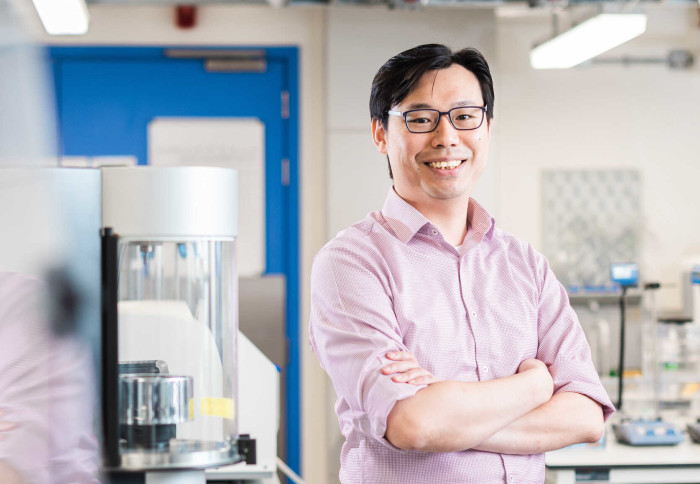Professor Koon-Yang Lee receives prestigious Young Investigator Award
by Ayesha Khan

Aeronautics’ Professor, Koon-Yang Lee, is awarded for his research on nanocellulose composites.
The KINGFA Young Investigator Award, sponsored by Kingfa Scientific and Technology Co., honours excellent contributions made by young investigators to the science and technology of cellulose and renewable materials.
...it’s great that my scientific contributions are recognised by this prestigious award from one of the leading authorities in cellulose materials, the Cellulose and Renewable Materials (CELL) Division of the American Chemical Society. Koon-Yang Lee Professor in Polymer Engineering
Koon-Yang leads the Future Materials Group, at Imperial, which focuses on the creation of chemical engineering-driven nanocellulose composite technologies.
His research is highly multi-disciplinary with focus on tailoring the interface between two (or more) phases in order to bridge the gap between chemistry, chemical engineering, physics, materials science, and engineering.
Koon Yang’s work in this area is supported by the core research principles of simple design, manufacturability, and radical effects.
Koon-Yang Lee, Professor in Polymer Engineering, said: “My research draws focus on developing cellulose nanocomposite innovations that will target engineering applications that cannot be achieved by conventional polymers alone and could serve as alternative to traditional glass fibre-reinforced polymers.”
Cellulose nanopaper: A building block for high-performance advanced materials
Production of high-performance nanocellulose-reinforced polymer requires a high incorporation (>30vol%) of nanocellulose into the polymer matrix. However, dispersing such a high loading fraction of nanocellulose into a polymer matrix is not possible.
Koon-Yang’s research group have pioneered a method using high performance cellulose nanopaper as a two-dimensional polymer reinforcement. His research shows that such reinforced polymer composites can be curated by process of lamination.
This advancement has led to cellulose nanopaper being utilised in high value transparent armour applications.
Mechanical behaviour of cellulose nanopaper
Researchers have intensively studied the formation of nanocellulose film but there is a knowledge gap in regards to its mechanical behaviour. The Future Materials Group has been researching the mechanical response of cellulose nanopaper in pursuit of engineering ever stronger nanocellulose materials.
The group has conducted the first ever comprehensive study on the tensile testing of cellulose nanopapers, providing the nanocellulose community with a “best practice guide” in cellulose nanopaper testing.
They have also discovered that cellulose nanopaper displays a divergent tensile response at intermediate tensile strain rates. Instead of strain rate hardening behaviour like most common engineering materials, cellulose nanopaper does not exhibit any strain rate sensitivity due to the high degree of hornification in cellulose nanopaper. This behaviour allows for use of cellulose nanopaper in packaging applications.
Nanocellulose as a binder
Commercialisation of nanocellulose for advanced engineering presents challenges such as high cost and its strong hornification effect. Koon-Yang’s research group has developed an elegant, intrinsically scalable and cost-effective technology for binding loose natural fibres together to create an in-plane non-woven fibre mat. The technology only utilises low loading fraction (<10 wt.-%) of nanocellulose, with no extra chemical modification steps involved during the production.
Using this method easily offsets the high cost of nanocellulose, due to use of the low loading fraction, as well as allowing for the creation of materials with dramatically improved mechanical performance that conventional materials cannot achieve.
This research contribution provides a huge step towards developing nanocellulose-enhanced products that can easily penetrate the mass market.
Article text (excluding photos or graphics) © Imperial College London.
Photos and graphics subject to third party copyright used with permission or © Imperial College London.
Reporter
Ayesha Khan
Department of Aeronautics